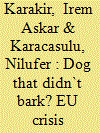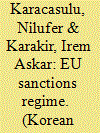|
|
|
Sort Order |
|
|
|
Items / Page
|
|
|
|
|
|
|
| Srl | Item |
| 1 |
ID:
148533


|
|
|
|
|
| Summary/Abstract |
Based on the commonly held assumptions about the inability of the European Union (EU) to cope with new challenges, this paper raises the question of whether the EU will assume greater responsibility for peace, especially in its neighborhood, in the short-term. It contributes to answering this question through focusing on EU mechanisms, instruments and policies of crisis management (civilian-military) since the 1990s, which is embodied in the European Security and Defense Policy (ESDP). In March 2015, the European External Action Service (EEAS) presented a report on CSDP indicating problems in crisis management. Yet, the EU strives for efficient activities. It considered reviewing its neighborhood policy as well as Common Security and Defence Policy (CSDP) to enable more effective actions to deal with crises. Today, it has a huge “toolbox” to address crises. The EU attaches great importance to a coherent and comprehensive strategy in crisis situations. Observing that a comprehensive strategy of the EU was launched in early 2015 to deal with the crisis in Syria, this paper questions to what extent the EU`s new arguments for crisis management are realized in its regional strategy for Syria. While the Syrian crisis is still unfolding, its impacts on the EU in the form of rising terror attacks in Europe by Islamic State in Iraq and Syria (ISIS), and an unprecedented influx of migrants are remarkable.
|
|
|
|
|
|
|
|
|
|
|
|
|
|
|
|
| 2 |
ID:
134081


|
|
|
|
|
| Publication |
2014.
|
| Summary/Abstract |
Although there is enormous discussion on normative power Europe, there is relatively less focus on the EU sanctions regime, though sanctions have become a useful foreign policy tool as the EU has applied sanctions within the framework of the Common Foreign and Security Policy. Looking at the literature, Kreutz focused on the EU sanctions regime in the time period of 1981-2004, during which sanctions
were used to accomplish normative goals. Yet, later on Brummer argued that although norms and values still play a role in the EU's sanctions regime, more often they were surpassed by security and economic interests. This article examines the previous work on the EU sanctions regime and tries to comprehend why the use of sanctions has increased over time as well as whether they have been "selectively" used. In addition, the article analyzes whether the normative commitment is crucial in the construction of the EU sanctions regime. The EU sanctions regime toward Iran is analyzed in particular, because as indicated by Santini and Tabrizi, Iran is the first country against which the EU has developed a new strategy out of weapons of mass destruction concerns, starting in 2006. Since 2010, EU foreign ministers have adopted tougher sanctions in an effort to block its controversial nuclear program. Recently, the Iran nuclear deal of November 2013 was interpreted as attributable to sanctions against Iran, in which EU sanctions have constituted a remarkable role, have proven effective.
|
|
|
|
|
|
|
|
|
|
|
|
|
|
|
|
|
|
|
|
|